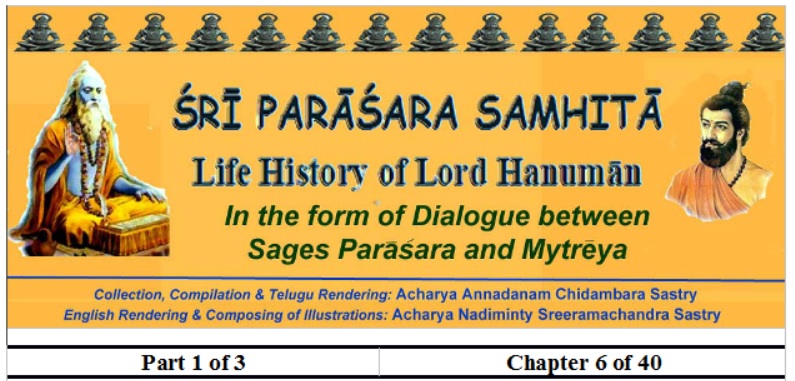
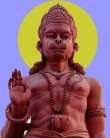
6th Chapter (Şaşţţa Paţalah)
The Story of Hanumān’s Birth
(Hanuajjanmakathanamm)
मैत्रेय: –
Mytrēya:
भगवन्हनुमन्मंत्रप्रभावो भवतश्श्रुत:
तस्योत्पत्तिं स्वरूपं च श्रोतुमिच्छाम्यहं प्रभो।। 1
“Oh! Great soul! I heard the power of influence of the Hanumnmatra from your respected self. I wish to hear about the birth and form of Hanumān.
हनुमन्नाम वा को सौ कस्य पुत्रस्स कीदृश:
किंकर्मा तस्य चोत्पत्ति: कथं ब्रम्हान्वदस्व मे।। 2
Who is that person known as Hanumān? Whose son is He? What type of person is He? What does He do? Oh! Foremost of sages! Tell me how His birth took place”.
पराशर:
Parāśara:
इतिहासं पुरा वक्ष्ये मैत्रेय ऋणु तत्त्वत:
छाया नाम महासाध्वी तनूजा विश्वकर्मण:।। 3
“Oh! Mytrēya! I am telling you the facts that happened in the past. Listen with attention. Viśvakarma, the celestial architect-engineer, had a great accomplisher daughter named Chāya (Sañgya).
स तां ददौ भास्कराय सा न सेहे रवे: प्रभाम्
मात्रा पृष्टा वदत्कन्या दुर्गम: पतिसन्निधि:।। 4
Viśvakarma performed her marriage with Sun god. She was unable to bear the brilliance of the Sun. On being questioned by her mother, she told that she is unable to be with her husband (Sun).
मातर्ममाभूदधुना तस्य तीक्ष्णकरेण वै
पुत्रिकावचनं श्रुत्वा सावदत्स्वपते: प्रसू:।। 5
Her mother told her daughter’s words ‘I am not able to stand before the harsh rays of the Sun’, to her husband (Viśvakarma).
भार्याया वचनं श्रुत्वा विश्वकर्मा प्रभाकरम्
शाणतस्तं स्वल्पप्रभं चक्रे स करदीधितिम्।। 6
Hearing his wife’s words, Viśvakarma shaved off part of the Sun (rays) making him less brilliant.
भानोश्छित्रकरच्छायात्कन्या जाता सुवर्चला
ब्रह्मदयो लोकपालास्तत्सौंदर्याद्विसिष्मिरे।। 7
Out of the rays separated from Sun was born a girl named Suvarcchala. Brahma, the creator and other gods for greatly surprised by her beauty.
ब्रम्हाणं परिपप्रच्छुर्देवा इंद्रपुरोगमा:
एनां धृत्वा पति: को वा भूयादब्रह्मन्वदस्व न:।। 8
Led by Indra, the gods went to Brahma and asked, ‘Oh! Lord Brahma! Who is going to be her husband? Please tell us’.
ब्रम्होवाच :-
ईश्वरस्य महत्तेजो हनुमान्दिवि भास्करम्
फलबुध्द्ध्या तु गृह्णीयात् तस्य भार्या भविष्यति।। 9
Hearing Brahma say, “Hanumān, the very powerful essence of Lord Siva, will be catching the Sun, thinking him to be a fruit. She is going to be his wife”; hearing this the gods went back to their places.
Celestials vs Demons:
राक्षसै: पीडिता देवा ब्रम्हाणं शरणं ययु:
बाधंते राक्षसा नित्यं ब्रम्हान्लोकानृषींश्च न:।। 10
Afterwards, the gods – celestials – being troubled by the demons went to Brahma and said, “Oh! Lord Brahma! The worlds, sages and we ourselves were being troubled continuously by the demons.
तेषां कुरु वधोपायं त्वं हि न: परमा गति:
इत्युक्तो त्रा ह तान् देवान् मया न ज्ञायते वध:।। 11
Please do something to destroy them. You are our only rescuer.” Then Brahma said to them, “Oh! Celestials! I do not know the method of destroying.
शंकरं परिपृच्छामो गच्छामो रजताचलं
तत्र गत्वा महादेवमूचुस्ते सपितामहा:।। 12
Let us go to Kailāśa (abode of Siva). Let us ask Śankara.” Thus they went to Kailāśa along with Brahma and asked Paramēswara
राक्षसानां वधोपायं कुरु रुद्र महाप्रभो।। 13
“Oh! Great One! “Kindly tell us the way to destroy the demons”
शंकर उवाच :-
नरनारायणं देवमार्तानां च परायणम्
तिष्ठंतं परमक्षेत्रे नित्यं बदरिकाश्रमे
तं पृच्छाम: सुरश्रेष्ठा गच्छामस्तत्र माचिरम्।। 14
Śankara said, “Oh! Best of the Celestials! Let us go quickly and ask the dweller in the the best of places – the Badarikāvana (Jujube forest), the God that has protection of the asylum seekers as the main duty, Lord Naranārāyaņa.” Then,
ब्रह्मोशादिसुरास्सर्वे नरनाययणप्रभुम्
नमस्कृत्य जगन्नथं पप्रच्छुरिदमादरात्।। 15
Brahma, Ēśwara and other celestials went to and bowed (Vandana, Pranāma) to the Lord of the World (Jagannātha) Lord Naranārāyaņa respectfully told so.
बाधन्ते राक्षसा नित्यं नरनारायण प्रभो
एतेषां तु वधोपायं क्षिप्रं कर्तुमिहार्हसि।। 16
“Oh! Lord Naranārāyaņa! The demons are troubling us continuously. You please tell us right now the method of destroying them.” Then.
समुहूर्तमिव ध्यात्वा प्रोवाच सकलान् सुरान्
भविष्यति न संदेहो राक्षसानां वधस्सुरा:।। 17
Naranārāyaņa thought for a while and said to them, “Oh! Celestials! Destruction of the demons will happen. No doubt what so ever.”
इत्युक्त्वा स्वात्मनस्तेजस्समाकृष्य जनार्दन:
ब्रम्हणश्च सुराणां च तेजसा साकमीशितु:।। 18
Having said so, Jagannātha added his own radiant energy with that of Brahma and other celestials
पिंडीकृत्य ददौ रुद्रं पपौ सर्वामरात्मकम्
अथोवाच हरि: व्यक्तिरेतत्तेजोद्र्व: सुरा:।। 19
Made it into a ball and gave it to Ēśwara. Ēśwara swallowed that. Then Vişņu said, “Oh! Celestials! From this (combined) radiance will be born a powerful monkey.
हरं त्यक्त्वा सुरास्सर्वे गच्छतेति यथागतम्।। 20
All of you now leave Śiva and go away.”
तत: काले महादेव: पर्यटन्पृथिवीमिमां
पार्वतीसहितश्श्रीमान् वेंकटाख्यं गिरिं गत:।। 21
After some time, touring the entire Earth along with consort Pārvati, Śiva reached Venkatācala (main of the Seven Hills of Tirupati).
नित्यं सन्निहितो यत्र श्रीनिवासस्सतां गति:
लभंते पौरुषानर्थान् यस्मिन्पंडितपामरा:।। 22
That hill is the abode of the protector of good people – Lord Śrīnivāsa (Vişhņu). Scholars as well as ordinary people pray and get their wishes fulfilled by that Lord.
तौ तत्र दंपती चैके शेषाख्ये चित्रकानने
शेरतु: परमामोदे निर्मलोदसरिद्वरे।। 23
That Couple (Śiva & Pārvati) strolled for some time on Śēşasaila (Mount Śēşa the grand snake) that is full of pleasant pure water lakes.
एकदा परमप्रीता पार्वती पतिदेवता
क्रीडंतं सुरतासत्तकपियुग्मं ददर्श ह।। 24
Once, happy Pārvati, who considers her husband as God in person, saw a couple of playing monkeys intent on love making.
ततस्सा ह्रीमती बाला महादेवस्य पश्यत:
पुष्पसांद्रेषु कुंजेषु तदा रंतु मनोदधे।। 25
Then she looked at her husband sensually, simultaneously wishing pleasure giving in the flower bushes.
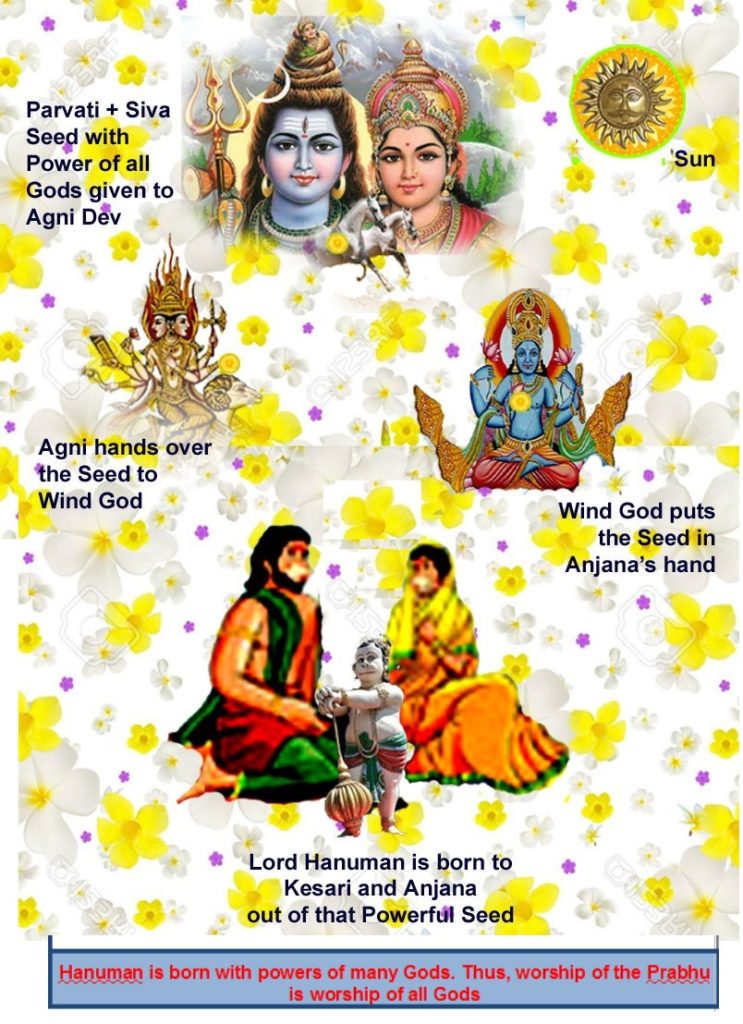
सर्वज्ञस्तदभिप्रायं ज्ञात्वा स कपिरूपधृत्
रमयामास तां देवीं कपिरूपधरां शिवाम्।। 26
He, all-knowing (saevgñya) Śiva, understanding the wish of Pārvati, took the form of a monkey and, in that very form, joined with the beautiful Pārvati.
सहस्राब्दप्रमाणेन क्रीडित्वा स महाद्युति:
तत्तेज: पार्वतीगर्भे निधाय विरराम ह।। 27
That great soul Śiva, continued the love act for a thousand years and ended it after introducing into her womb the mass of radiant power (of gods) given to him by Vişņu.
अग्नौ चिक्षेप तत्तेज: पार्वती धारणाक्षमा
स चाप्यशक्तस्तद्वायौ निक्षिपन् विससर्ज ह।। 28
Unable to bear that radiant power, Pārvati put it in fire (Agni). Even the fire god, unable to bear its powerful radiance, out it in the air (Vāyudēva, Wind God).
तस्मिन्केसरिणो भार्या कपिसाध्वी वरांगना
अंजना पुत्रमिच्छंती महाबलपराक्रमम्।। 29
At that time, wishing for a very mighty son, Añjanādēvi – a pious lady of the monkey clan and wife of the king of monkeys Kēśari
तपश्चचार सुमहत्रियतेंद्रियमानसा
तस्यै वायु: प्रसन्नात्मा प्रत्यहं फलमर्पयन्।। 30
Was performing a great penance by controlling her senses. Out of affection for her the Wind God used to present a fruit to her daily.
भक्षार्थमेकदा तस्यास्तत्तेजश्चार्पयत्करे
फलबुद्ध्या तु तत्तेज: साप्यभक्षयदंगना।। 31
One day He put that mass of radiant power in her hand. Thinking that it is a fruit, she ate it.
नातिदीर्घेण कालेन चांजनापतिदेवता
स्वांगेषु गर्भचिह्नानि सा दृष्ट्वा ह्रीमना ह्मभूत्।। 32
Not long after that, that faithful wife (pativratā) Añjana felt shy and distressed to note changes in her body indicative of conception.
विस्मयाविष्टचित्तां तां व्रतभंगविशंकितां
ध्यायन्ती भयवित्रस्तामाभाष्याहाशरीरिणी।। 33
To Añjana, afraid of the ensuing signs of conception, worried that the harm it may cause to her fidelity to her husband (pātivratya), in doubt and fear even during her meditation, a Voice from the Sky (Ākāśavāņi) said,
माभूत्ते व्रतभंगो यं मा विषीद वरानने
देवप्रसादात्ते गर्भे महाव्यक्ति: भविष्यति।। 34
“Oh! Añjanādēvi! There is no disturbance to you pious austerities. Don’t feel sad. Bo God’s grace, a great personality will be born to you.”
एवमुक्ता तु सा देवी मुदा परमया युता।। 35
So told, she became very happy.
वैशाखे मासि कृष्णायां दशमीमंदसंयुता
पूर्वप्रोष्ठपदायुक्ता कथावैधृतिसंयुता।। 36
On the 10th day in the waning-moon fortnight (Kŗşņapakşa) of the Vaiśākha (2nd lunar) month, that was a Saturday (Śanivāsara) in Pūrva Bhādrapadā (Western name α and β Pegasi) star constellation with the auspicious Vaidhŗrutiyōga alignment (the Yoga star of the 27th lunar mansion)
तस्यां मध्यान्हवेलायां जनयामास वै सुतम्
महाबलं महासत्त्वं विष्णुभक्तिपरायणम्।। 37
In the afternoon, Añjana gave birth to the son. He is mightily built, very powerful and an ardent devotee of Vişņu.
सर्वदेवमयं वीरं ब्रम्हाविष्णुशिवात्मकम्
वेदवेदांगतत्त्वज्ञं सर्वविद्याविशारदम्।। 38
Virtues of Infant Hanumān:
A confluence of valor of all divinities (sarvadēvātmaka), creator-maintainer-liberator (sŗşţhi sthiti layātmaka) as an amalgamation of Brahma-Vişņu-Śiva, knower of the essence of Vēdas (Knowledge) and Vēdāngas (specific parts of Vēdas), excelling in all schools of learning (Vidyas),
सर्वब्रह्मविदां श्रेष्ठं सर्वदर्शनसम्मतं
माणिक्यकुण्डलधरं दिव्यपट्टांबरान्वितम्।। 39
The best among all the worlds of the Supreme Being (brahmagñya lōka śrēşţha), whose logic on all spiritual works is acceptable to all, wearer of ruby studded ear rings, wearer of heavenly silks,
कनकाचलसंकाशं पिंगाक्षं हेममालिनं
स्वर्णयज्ञोपवीतं च मणिनूपुरशोभितम्।। 40
Equal to the mighty Mēru mountain (in Himalayas), one with golden coloured eyes, wearer of golden sacred thread (yagñyōpavīt), wearer of diamond studded anklet,
ध्वजवज्रांकुशच्छत्रपद्मरेखांघ्रिसंयुतं
दीर्घलांगूलसहितं दीर्घकायं महाहनुम्।। 41
Holder of flag (dhwaja), diamond-weapon (vajrñyudh), elephant goad, parasol, with his soles embellished with lotus (padma) line-figures, with a long tail, mighty body and prominent jaw,
कौपीनकटिसूत्राभ्यां विराजितमहाभुजम्
आश्चर्यभूतं लोकानां वज्रसंहननं कपिम्।। 42
Wearer of tight underwear (koupīna) and the sacred waist thread, having great shoulders, diamond-strong body and in the form of a monkey,
सर्वलक्षणसंपéकिरीटकनकांगदं
प्रभया मितया विष्णोरवतारमिवादरम्।। 43
Having all auspicious features, crown, golden shoulder guards, with unlimited radiance, He is looking like as though the incarnation of Vişņu.
पपात पुष्पवृष्टिश्च नेदुर्दुदुर्भयो दिवि
ननृतुर्देवगंधर्वास्तुष्टुवुस्सिद्धचारणा:
ववौ वायुस्सुखस्पर्श: सरितो निर्मलोदका:।। 44
Happenings around Hanumān’s Birth:
There was a rain of flowers at that time. Celestial drums sounded in the Heaven. Gandharvas (musician celestials) danced. Achievers (siddhas) and bards (cāranņs) praised with invocations. The winds weaved contentedly in the forests. Rivers became pure.
यदांजना केसरिधर्मपत्नी ह्मसूतबालं कपिसार्वभौमं
प्रदक्षिणाकारशिखं मुनीनां तदैव वह्नित्रितयं विरेजे।। 45
When the pious wife of Kēśari, Añjana gave birth to the best monkey son, all the three sacred fires (Garhapatya = household fire representative of the father; Dākşāgni = sacred lamp, representative of the mother; and Āhavanīya = Sun as fire, representative of the teacher;) were shining grandly in circular flames.
प्रसूतिगंधानिलसंभृतेषु वनेषु मत्ता मकरंदनिर्झरै:
मिलिंदसंघा विचरंति सर्वत: सकोरकै:पल्लवितद्रुमेषु।। 46
In forests and gardens, floating in flower-scented gentle winds, amidst budding and just blooming trees, with flowers full of honey, the bees flew around merrily.
पतंति रत्नानि सुरेतराणां किरीटकोटिग्रथितान्यकांडे
तदंगनामानसगह्ररेषु सगर्भकंपं भयमाविवेश।। 47
Precious stones from the crowns of demons fell off without reason at the time of birth of Hanumān. The hearts of demonesses as well as infants still in their wombs trembled.
तत: प्रोवाच तां बालश्चतुष्पंचदिनान्तरे
अमायां मातरं दृष्ट्वा आहारो मे प्रदीयताम्।। 48
Hanumān ‘Eating’ Sun:
On the no-moon day that cam four-five days later infant Hanumān looked at His mother and asked for food.
इत्युक्त्वा प्राह तं देवी लालयंती सुतं सती
सुपक्वं च फलं सूनो यत्र कुत्रापि भुज्यताम्।। 49
Cuddling the baby she said, “My son! Eat a ripe fruit wherever you get it”.
आंजनेय: प्रह्र्ष्टात्मा दिवमुत्पत्य वेगत:
शिशुरुद्यंतमादित्यं फलबुद्ध्या गृहीतवान्।। 50
Happy at that, Āñjanēya flew up into the sky and caught the rising Sun, thinking that it is a fruit.
मुखेन गलितं भानुं दृष्ट्वा कोपात्पुरंदर:
चिंतायामास को न्वेष महासत्त्व: प्रदृश्यते।। 51
Seeing the Sun caught in Hanumān’s mouth Dēvēndra thought, “Who is this, who seems to be a very mighty person” and worried.
इति विस्मयमापन्नो वज्रमुद्यम्य वृत्रहा
बाले चिक्षेप रोषाच्च रोम्णा वज्रमपोथयत्।। 52
A surprised Dēvēndra threw his Diamond Weapon (vajrāyudha) at that infant boy. Āñjanēya stopped it with a hair (of His).
मोघं तत् कुलिशं दृष्ट्वा ब्रह्मणो स्त्रमयोजयत्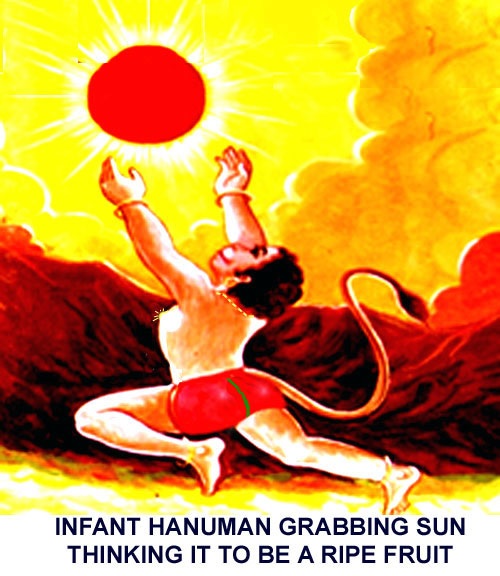
तच्चापि रोम्णा चिक्षेप विस्मिताश्चाभवन्सुरा:।। 53
Seeing the Diamond Weapon go waste thus Dēvēndra used the all powerful Creator’s Weapon (Brahmāstra). Āñjanēya stopped even that with a hair. This surprised the celestial no end.
ततस्तं प्रार्थयांचक्रु: पितामहपुरोगमा:
अंजनासुप्रजावीर पार्वतीस्वररसंभव
समर्थो सि महावीर महाबलपराक्रम:
नराणां च सुराणां च ऋषीणां च हिताय वै।। 54
Then Brahma and other celestials requested Āñjanēya so, “Oh! Valorous son of Āñjana! The one born to Pārvati and Paramēśwara! Great Hero! With your mighty strength great valor, you are capable doing good to people, celestials and sages.
जगत्प्राणकुमारस्त्वं अवतीर्णो सि भूतले
सत्क्रिया न प्रवर्तते वेदोक्ता: क्रतवस्तथा
त्यज सूर्यमिति प्रोक्तस्स मुमोच प्रभाकरम्।। 55
Oh! Āñjanēya! You came into this world as the son of Wind God (vāyu) the very life of this world. All pious rituals stopped including the Vedic ritual. So please free the Sun. So requested Āñjanēya released the Sun.
एतदाश्श्चर्यमालोक्य कुलिशं मेघवाहन:
समर्थमपि चापल्यात् क्रीडासक्तं शिशुं कपिम्
हनौ चिक्षेप वेगेन स पपात शिलातले।। 56
Impacted by this miracle Indra hit oblivious Āñjanēya on the jaw with his Diamond Weapon. Immediately He (Āñjanēya) fell on a stone slab.
मूर्छितं बालकं दृष्ट्वा वायु: परमकोपन:
प्राणास्सर्वशरीरेषु निगृह्मा न चचाल ह।। 57
Seeing his swooned son Wind God became very angry and withdrew air from all and became still.
प्राणेषु निगृहीतेषु न प्रवृत्ता: क्रियास्तत:
अचेतनवदत्यंतसम्मूढमभवज्जगत्।। 58
Without life sustaining air, all aspects of the world came toa standstill. The whole Universe last consciousness and became confused.
ततो देवास्सगंधर्वा: सिद्धाश्च परमर्षय:
ब्रह्मा विष्णुश्च शंभुश्च शक्रश्चापि समागत:।। 59
Then the Gods (dēvas), Singer Celestials (gandharvas), Achievers (siddhas), great sages (mahaŗşis), Brahma, Vişņu, Śambhu (Śiva), Dēvēndra came (there).
वरैस्तं छन्दयामासु: वायुं विबुधदुर्लभै:
दीर्घमायुर्बलं शौर्यमारोग्यं चा प्यधृष्यतां
बुद्धिं विद्यास्तपस्तेजो वाक्पटुत्वप्रसन्नताम्।।
चातुर्यं धैर्यवैराग्ये विष्णुभक्तिकृपालुतां
परनारीषु वैमुख्यं अपचारसहिष्णुताम्।। 60
Hanumān’s Boons, Names & Virtues:
They all appealed and vouched to Wind God that they will bestow such boons on the boy that even the celestials cannot get. Long life, strength, valor, health, unparalleled good characters (suguāh), wisdom, all Knowledges (vidyāh), austerity (tapas), brilliance (tējas), eloquence (vākpatutva), pleasantness (prasannatā), shrewd (catur), fearless (dhairya). detachment (vairāgya), devotedness to Lord Vişņu, kindness (dayā), motherly respect to other women, capacity to pardon,
अजेयत्वं च सर्वास्त्रै: सवैर्देवासुरैरपि
एतानयांश्च कल्याणवरान्दत्वाययुस्सुरा:
ततस्तुष्टावांजनेयं ब्रह्मलोकपितामह:।। 61
Invincibility by any weapons and all celestial and demon clans, and many other auspicious boons were bestowed by gods. After they left, paternal figure of the world, creator Brahma praised Hanumān thus.
ब्रह्मोवाच :-
साक्षाद्विष्णुरिव श्रीमान् देवानुद्धारयिष्यसि
सर्वराक्षससंहारं करिष्यसि यथा हर:।। 62
Brahma said, “Hanumān! Like Vişņu you can do well for the gods. Like Śiva you can destroy all the demons.
लंकादैत्यवधं कृत्वा रामकार्यपरायण:
संजीवनाचलं नीत्वा लक्ष्मणं जीवयिष्यसि।। 63
Killing demons in Lanka, you will involve yourself in the work of Lord Srīrāma, you will bring the herbs laden Sanjīvi mountain and give life to Lakşmaņa.
सीताप्रवृत्तिमानीय रामं संतोषयिष्यसि
त्वं बुद्धिमान् महाशूरो महाबलपराक्रम:
भवानजेयस्सर्वास्त्रै: तथापि प्रार्थनान्मम
अंगीकार्यं त्वया वीर क्षणं ब्रम्हास्त्रबंधनम्।। 64
You will find out where Sītā is located and give happiness to Srīrāma by giving that information. Oh! Āñjanēya! You are intelligent, very valorous and powerful. You cannot be won by any weapon. But I plead you to surrender yourself briefly to the Creator’s Weapon (Brahmāstra) (by way of respect).
महादेवप्रभावाद्धि रुद्रस्यामिततेजस:
तेजसो पि सुराणां त्वं ऐश्वरं तेज ऊर्जतम्।। 65
Because of possessing Rurdra’s radiance you will be more radiant than the gods and powerfully built too.
पार्वतीगर्भसंभूते: पार्वतीगर्भनामवान्
अग्निना धार्यमाणत्वात् अग्निगर्भो भवान्भवेत्।। 66
Because you were born to goddess Pārvatī you will be known as Pārvatīgarbha. Because Fire God (Agni) carried you, you will be known as Pārvatīgarbha.
वायुप्रसादजननात् वायुपुत्रो निगद्यसे
अंजनागर्भजननात् आंजनेयस्ततो भवान्।। 67
Because you were born via intervention of Wind God’s (Vāyu), you will be known as Vāyuputra. Since you were actually born to Añjana you are Āñjanēya.
केसरिक्षेत्रजन्यत्वात् पुत्र: केसरिण: कपे:
हनूवज्रप्रहाराद्धि हनुमानिति नाम ते।। 68
Because you were born to Kēśari you are Kēśarīnandan. Because you were struck on you jaw (hanuvu) by the Vajrāyudha you will be known as Hanumān or Hanumanta.
ब्रह्मविष्णुशिवांशत्वात् त्रिमूर्तिरिति विश्रुत:
सर्वदेवांशसंभूते: सर्वदेवमय: स्मृति:।। 69
You will earn fame as Triple-souled (Trimūrtyātmaka) because you were born out of the radiant essences Brahma, Vişņu and Mahēśwara. You will be known as Sarvadēvamaya (Abode of all Gods) as you were born with the radiant essence of all the Gods.
हनूमत्पूजया तस्मात् पूजितास्सर्वदेवता:
प्रतिग्रामनिवासश्च भूयाद्रक्षोनिवारणे।। 70
Thus, worshipping Hanumān means worshipping all the gods. When one prays Hanumān, all the divine personalities will be happy.
इत्युक्त्वा लोकनाथो पि तत्रैवांतरधीयत।। 71
So saying, Lord of the world (lōkanāyaka), the Creator Brahma disappeared.
आंजनेयस्तत:काले ब्रह्मचर्यपरायण:
समर्थो पि महातेजा: संपश्यन्लोकसंग्रहम्।।
सूर्यमंडलमुत्पत्य वेदाध्ययनकारणात्
सप्रश्रयमुवाचेदं नमस्कृत्य दिवाकरम्।। 72
Hanumān’s Education & Marriage:
Afterwards, though knowing that Himself (Hanumān) is staunchly celibate, omniscient and all-capable, keeping in view the need for welfare of the world (people and land), with the intent of studying the Vedas, Hanumān flew to the Sun (Sūrya), bowed to him and reverently requested so.
सांगोपनिषदो वेदान् मम वक्तु त्वमर्हसि
रवि: प्रोवाचांजनेयं अवकाशो न विद्यते।।
ईश्वरस्य वशे तिष्ठन् भ्रमामीह तदाज्ञया।। 73
“Oh! Lord Sun! Teach me Veda, Vēdāñgas (Veda parts), its subparts (upāñgas) in detail”. Ten upon the Sun said to Hanumān, “I am under the control of Ēśwara (Śiva) and upon the command of that all-pervading Ēśwara (Sarvēśwara) I always go around. Thus I have no scope to teach you.
इत्युक्तो हनुमान्कोपात् निरुन्धे तस्य पद्धतिम्
त्वमेवोपायवक्तेति सांत्वयामास तं रवि:।। 74
On hearing thay Hanumān got angry and blocked the Sun’s path. There upon the Sun calmed Hanumān asking Him to find out a solution, which they can follow.
सूर्योन्मुखं पृष्ठगतो हनूमानेकवासरे
इंद्रव्याकरणं सूर्यात् धारयंश्च महात्मन:।। 75
Then Hanumān turned facing the Sun and walking backwards (as the Sun moved, always facing the Sun) He learnt the Indravyākaraņ (the first Sanskrit grammar text by an ancient scholar) from the Sun.
ततो हनूमानेकं स्वं पादं कृत्वोदयाचले
अस्ताद्रावेकपादं च तिष्ठन्नभिमुखो रवे:।।
सांगोपनिषदो वेदान् अवाप्य कपिपुंगव:
भास्करं तोषयामास सर्वविद्याविशारद:।। 76
Then, by standing with one foot on the Eastern Mountain (udayādri) and another on the Western mountain (paścimādri), always facing the Sun he learnt sāṅgopāṅga the Vēdāñgas (Veda parts), its subparts (upāñgas), became adept in all knowledges
तस्य बुद्धिं च विद्यां च बलशौर्यपराक्रमान्
विचार्य तस्मै प्रददौ स्स स्वयकन्यां सुवर्चलाम्।। 77
Seeing Hanumān’s wisdom, knowledge, strength, prowess and courage, Sun offered his daughter Suvarcchala in marriage to Him.
तामुद्वाह्मा महातेजा हनुमान्मारुतात्मज:
भूय: किलकिलां कुर्वन् पुनरायान्महाकपि:।। 78
Son of the Wind God (mārutātmja or māruti) and highly radiant Hanumān married her happily.
Note: We may recall that Suvarcchala is the brightest part of Sun’s rays shaved off by Viśvakarma so that his daughter and Sun’s wife Chāya could be near her husband. Thus Suvarcchala (literally – brightest Sun rays), who, incidentally also a lifelong celibate is wedded to celibate Hanumān spiritually. It is not a physical marriage as humans undergo. According to Hindu tradition only a married person can perform auspicious rituals. And Hanumān has to be the key part of the future big ritual of bringing Sītā and Śrīrāma. That is how learned Gurus explained this to me – Nadiminty S Sastry.
इदं हनुमच्चरितं ये शृण्वंति पठन्ति च
लि खंति पुस्तके वा पि सर्वान्कामानवाप्नुयु:।। 79
Uniqueness of Hanumanmantra
Whoever hears or reads or writes in a book this history of Hanumān will get all their wishes fulfilled.
सुवर्चलासमेतश्रीहनुमद्द्वादशाक्षरम्
ये जपन्ति महात्मान: लभंते ते मनोरथान्।। 80
Whichever great soul piously recites the 12-lettered (dwādaśākşara) mantra of Suvarcchala-Hanumān will get all their wishes fulfilled.
जयंती नाम पूर्वोक्ता हनुमज्जन्मवासर:
तस्यां भक्त्या कपिवरं नरा नियतमानसा:।।
जपंतश्चार्चयंतश्च पुष्पपाद्यघ्र्यचंदनै:
धूपैर्दीपैश्च नैवेद्यै: फलैब्र्णह्माभोजनै:।।
समंत्राघ्र्यप्रदानैश्च नृत्यगीतैस्तथैव च
तस्मान्मनोरथान्सर्वान् लभंते नात्र संशय:।। 81
We discussed that the birthday of Hanumān is celebrated as Hanumajjanti. All desires are fulfilled when, with great attentions and devotion, people worship on that day Hanumān, the best of monkeys (vānaraśrēşţa) and offer flowers, water to wash feet (pādyam), water for drinking (ārghyam), sandal paste (gandham), incense (dhūpam), offering food (naivēdyam) in the form of fruits; by offering food to the Brāhmin people, sanctified water to fellow participants; satisfying with music and dance. There is no doubt in this.
एको देवस्सर्वदश्श्रीहनूमान्
एको मन्त्रश्श्रीहनूमत्प्रकाश:
एका मूर्ति: श्रीहनूमत्स्वरूपा
चैकं कर्म श्रीहनूमत्सपर्या।। 82
Hanumān is the only God who can bestow everything. Hanumanmantra is the only mantra. The only idolo is the idol of Hanumān form. The only good deed is worshipping Lord Hanumān. The only duty is serving Hanumān
जलाधीना कृषिस्सर्वा भक्त्यधीनं तु दैवतं
सर्वं हनूमतो धीनं इति मे निश्चिता मति:।। 83
Agriculture is totally dependent on water. God is in control of His devotees. But, everything is under the control of Hanumān. That is my firm belief.
हनूमान्कल्पवृक्षो मे हनूमान्मम कामधुक्
चिन्तामणिस्तु हनुमान् को विचार: कुतो भयम्।। 84
Hanumān is the wish-fulfilling tree (kalpavŗkşa) for me. Hanumān the all-giving cow (kāmadhēnu) for me. Hanumān the Thought Diamond (cintāmaņi) wish-fulfilling tree (kalpavŗkşa) for me. No doubt at all in this. No fear even, in future,” so said to Mytrēya.
“अथ पूजांते अघ्र्यप्रदानं कर्तव्यम्”
दशम्यां मंदयुक्तायां कृष्णायां मासि माधवे
पूर्वाभाद्राख्यनक्षत्रे वैधृतौ हनुमानभूत्।। 85
( श्रीसुवर्चलासमेतहनुमते नम: इदमघ्र्यं समर्पयामि। )
HANUMĀN-SUVARCCHALA ĀRGHYAPRADĀNA MANTRAS
Mantras for Presenting Water to Hanumān–Suvarcchala
On performing worship of Hanumān, one has to leave a little of water at the feet of the Hanumān idol (ārghyapradāna, i.e., after every sloka (hymn) say – “Śrī Suvarcchalāsamēta Hanūmatē ārghyam samarpayāmi” = I am presenting water to Śrī Hanumān along with Suvarcchalā.
Hanumān was born on the 10th day in the waning-moon fortnight (Kŗşņapakşa) of the Vaiśākha (2nd lunar) month, that was a Saturday (Śanivāsara) in Pūrva Bhādrapadā (Western name α and β Pegasi) star constellation with the auspicious Vaidhŗrutiyōga alignment (the Yoga star of the 27th lunar mansion). > Srī Suvarcchalasamēta Hanūmatē ārghyam samarpayāmi.
जात: कपिकुलांभोधौ स्वर्णरंभावनाश्रय:
भक्तसंरक्षणार्थाय गृहाणाघ्र्यनमो स्तु ते।। 86
(श्रीसुवर्चलासमेतहनुमते नम: इदमघ्र्यं समर्पयामि।)
Oh! The one born in the Money Clan! one who dwells in golden banana garden! Please accept water to save your devotees. I bow to thee. > Srī Suvarcchalasamēta …..
दुष्टानां शिक्षणार्थाय शिष्टानां रक्षणाय च
रामकार्यार्थजात: भूमौ श्रीहनुमान्कपि:।। 87
( श्रीसुवर्चलासमेतहनुमते नम: इदमघ्र्यं समर्पयामि। )
Hanumān rose to punish the evil doers, to protect the good doers and to perform Śrīrāma’s tasks. > Srī …
अंजनागर्भसम्भूत हनूमन्पवनात्मज!
गृहणाघ्र्यं मया दत्तं कपिवर्य नमो स्तु ते।। 88
( श्रीसुवर्चलासमेतहनुमते नम: इदमघ्र्यं समर्पयामि। )
The one born to Añjanādēvi! Hanumān! Son of Wind God! Accept the water presented by me. Oh! The best among Monkeys! I bow to thee. > Srī …
पूर्वाभाद्रकुम्भराशौ मध्याह्ने कर्कटांशके
कौण्डिन्यवंशे संजातो हनुमानंजनोद्रव:।। 89
( श्रीसुवर्चलासमेतहनुमते नम: इदमघ्र्यं समर्पयामि। )
Hanumān was born to Añjanādēvi in the afternoon of Kumbha (Aquarius) being Moon ascendant (chandralagna) in conjunction with Pūrvabhādra constellation with Karkātaka (Cancer) as the birth time ascendant (lagna) in the Koundinyasa clan (gōtra). > Srī …
मन्त्रम्
श्रीशब्दाद्धनुमच्छब्दो जयशब्दस्तत: परम्
हनुमान्जयशब्दं हि संपुटीकरणं परम्।।
जयद्वयावधिश्चोध्र्वं हनुमन्नाम वै तत:
मंत्रो यं षोडशार्णस्तु महापातकनाशक:।। 90
Mantra
Say the letter ‘Srī’, then ‘Hanumān’ then the word ‘jaya’ followed by ‘Hanumanjaya’, and again saying ‘jaya’ followed by ‘Hanumān’. This the 16_letered sodasaksramantra: “Srī Hanumān jaya Hanumanjaya jaya Hanumān” > Srī … = Victory to revered Hanumān, Victory to Hanumān, Victory to Hanumān.
इति श्रीपराशरसहितायां पंचमुखहनुमन्मन्त्रविवरणे पराशर मैत्रेयसंवादे हनुमज्जन्मकथननाम षष्ठ: पटल:।
Thus ends the 6th Chapter, entitled “The Story of Hanamān’s Birth” of Śrī Parāśara Samhitā
![]()
Devanagari transliteration

Click here to visit the Contents of the Part 1.
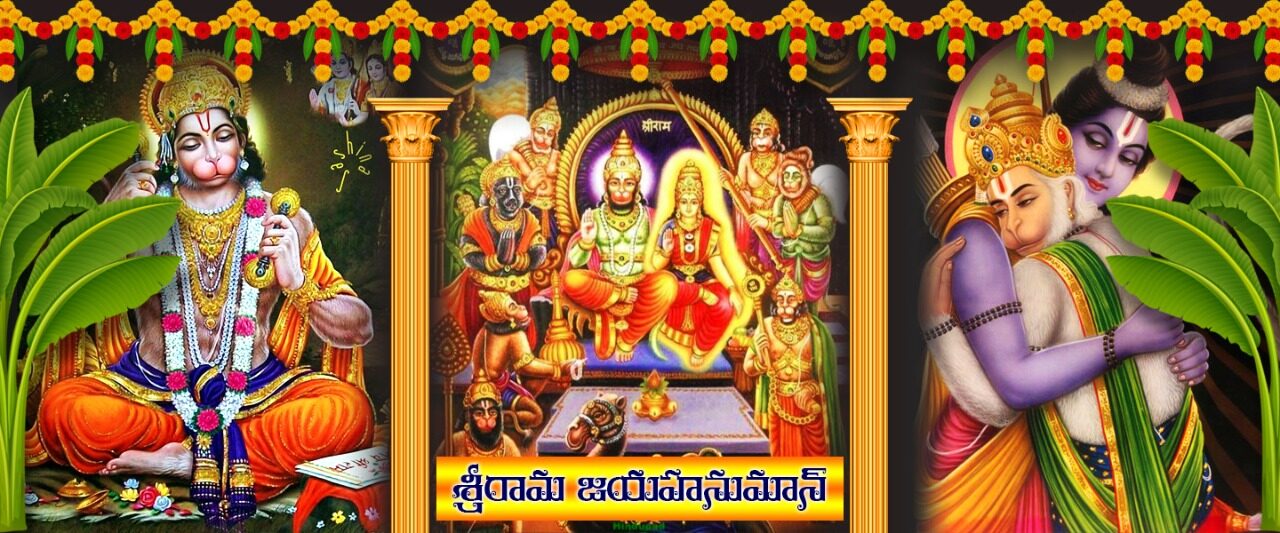
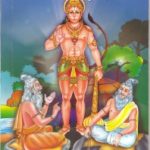

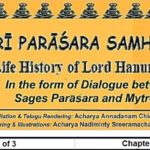
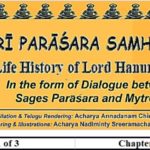

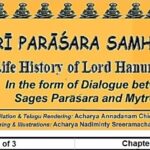
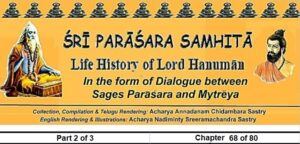
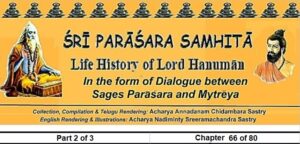
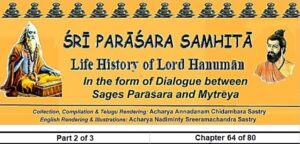
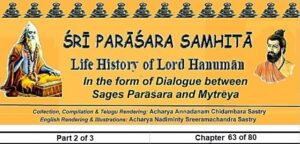
Be First to Comment